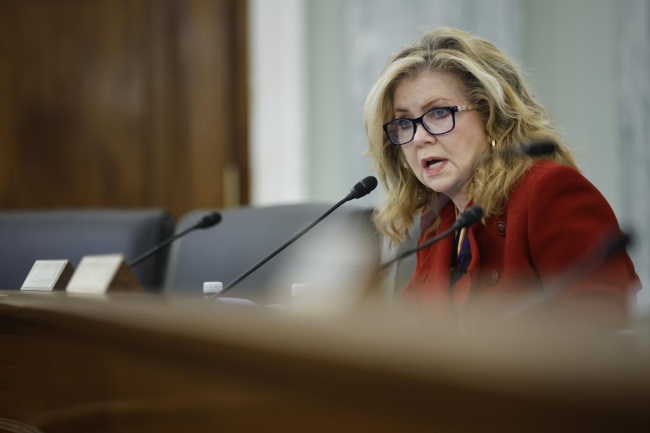You have /5 articles left.
Sign up for a free account or log in.

U.S. Senator Marsha Blackburn criticized the University of Memphis grant program.
Chip Somodevilla/Staff/Getty Images North America
Congressional Republicans representing Tennessee are harshly criticizing a University of Memphis plan to offer financial grants to faculty members who include equity and social justice in their course curricula.
The $3,000 grants would be given to faculty members interested in redesigning their course curriculums to advance “the tenets and charge of the University’s commitment to Diversity, Equity, Inclusion and Social Justice,” according to information about the grant emailed to faculty members by university administrators and obtained by The Washington Free Beacon.
The lawmakers say the grants are a waste of taxpayer money by the public institution.
U.S. Senator Marsha Blackburn said the grant program puts taxpayer dollars toward “a woke social justice agenda.”
“The University should be encouraging their students to be independent thinkers, expanding their worldview, learning how to be lifelong learners and respectful of all,” Blackburn said in a statement to Fox News.
“Leadership at the University of Memphis should be ashamed for bribing professors to advance this useless teaching,” U.S. Representative Tim Burchett of Tennessee told The Washington Free Beacon. “Students are better prepared for professional careers if they learn the three R’s—reading, writing, and arithmetic—instead of woke activism.”
A University of Memphis spokesman did not respond to repeated requests for comment.
Media coverage of the controversy over the grants was initiated by politically conservative news outlets with whom the lawmakers spoke. It comes at a time when Republican federal and state lawmakers around the country are fighting efforts to address equity and social justice issues in higher ed in the wake of the racial justice movement prompted by the police killings of George Floyd, Breonna Taylor and other unarmed Black Americans. It also is occurring within the context of debates regarding the teaching of critical race theory.
Nonetheless, the efforts are widely supported among higher ed leaders.
Irene Mulvey, president of the American Association of University Professors, celebrated the initiative.
“Any efforts to promote justice and equality in higher education and in society should be applauded,” Mulvey said in a statement to Inside Higher Ed. “Initiatives like this one at the University of Memphis, which encourages and enables faculty to take a fresh look at their own subject and view it through a lens of social justice, are essential if higher education is to fulfill its promise as a public good.”
Estela Bensimon, university professor emerita and founder of the Center for Urban Education at the University of Southern California, said taxpayers have been paying faculty members at public universities to teach curricula that treat “whiteness as the norm” for years, and the sum offered to faculty members as a curriculum-redesigning incentive is a small investment in comparison.
“We have left out so much of Black history, Black contributions, Latinx history, Latinx contributions, Native Americans from the curriculum,” she said. “Now we have to provide for repairing for that omission.”
The effort is part of the university’s Eradicating Systemic Racism and Promoting Social Justice Initiative, according to the University of Memphis website. The initiative, which involves 14 working groups focused on reforming different aspects of the university, was launched to “identify areas in need of reform and change, and implement that change to take another step in the direction of realizing the hope of a community defined by equality and justice.”
Faculty members who want to participate in the grant program must submit an essay about proposed reforms to an existing course by the end of January. A cohort of 15 to 20 faculty members, selected to start in spring 2022, will meet for trainings and workshops and present their strategies for redesigning their courses at the beginning and end of the grant program.
The goals of the incentive program are to identify and develop “actionable frameworks” and “critical curriculum review questions and protocols” for crafting courses aligned with social justice, as well as a conducive course “culture and climate,” according to an email signed by Tom Nenon, the university’s provost and executive vice president for academic affairs, and Karen Weddle-West, vice president for student academic success and director of diversity initiatives. The aim is also to develop scalable “models for curriculum self-assessment, program planning and continuous learning.”
Katherine S. Cho, assistant professor of student affairs and higher education at Miami University of Ohio, said colleges and universities often offer incentives to faculty members to update their curricula, which she believes is important to “help offset the labor” of faculty members.
Extra funds enable faculty members to devote time to making classes “more relevant to current context and current issues and on top of that really think about issues of who does not feel included in the syllabus,” said Cho, who studies critical social justice and institutional accountability.
She noted that diversifying curricula is also a tool universities use to try to improve retention rates for students of color.
“Retention is very much tied to sense of belonging, which is tied to being, like, ‘Well, do I see myself in the syllabus?’” she said.
Akil Houston, an associate professor of African American studies at Ohio University who coauthored a guide to antiracist pedagogy, said he isn’t surprised by the backlash to the incentive program. He pointed to the rash of recent legal attempts across the country to control how educators discuss race with their students, including two bills introduced in Ohio last May that restrict how the role of racism in U.S. history can be taught in public K-12 classrooms.
Pushback on initiatives to incorporate social justice into teaching is “very common and very much expected,” Houston said. “We’re in a space where we are being pushed by some state legislatures not to talk about the past in meaningful ways.”
A Tennessee law adopted in May penalizes public K-12 schools and districts that teach certain concepts related to race, including that “an individual, by virtue of the individual’s race or sex, is inherently privileged, racist, sexist, or oppressive, whether consciously or subconsciously” and “this state or the United States is fundamentally or irredeemably racist or sexist,” Chalkbeat Tennessee reported. However, the law does not apply to higher ed institutions.
Houston said the push to limit teaching about race is a reaction to the widespread national protests that followed the killings of Floyd and Taylor in 2020. But he said that such backlash isn’t new and noted that colleges and universities faced similar criticisms as far back as the 1960s, when institutions started to introduce ethnic studies courses and programs.
“During the heyday, the beginnings of African American studies, people argued it was pseudohistory, and it was really emotional,” he said. “I think every time a certain demographic in our society says, ‘Things are not right. We need to shift the way we think and the way we prioritize what we value,’ there are a number of people who say, ‘Absolutely … let’s do this,’ and there’s another group of people that says, ‘No, you thinking that is un-American.’”









